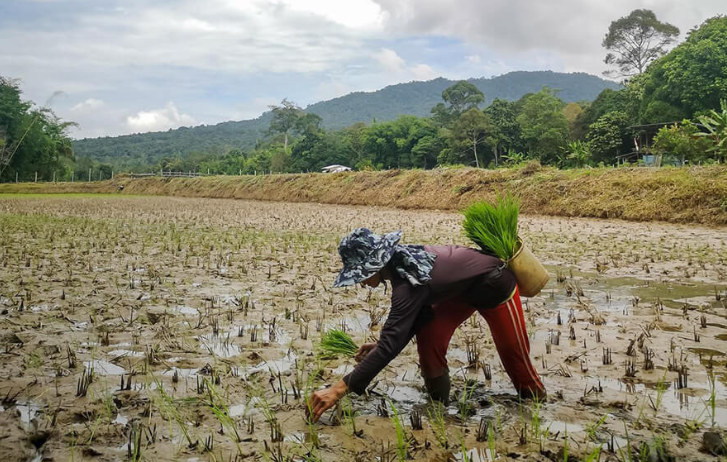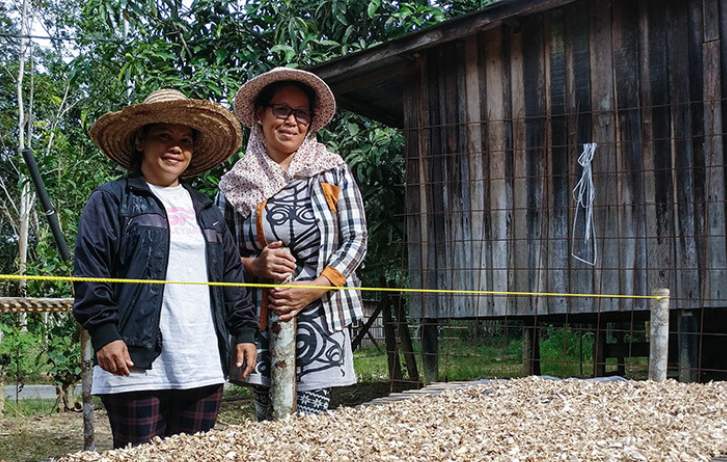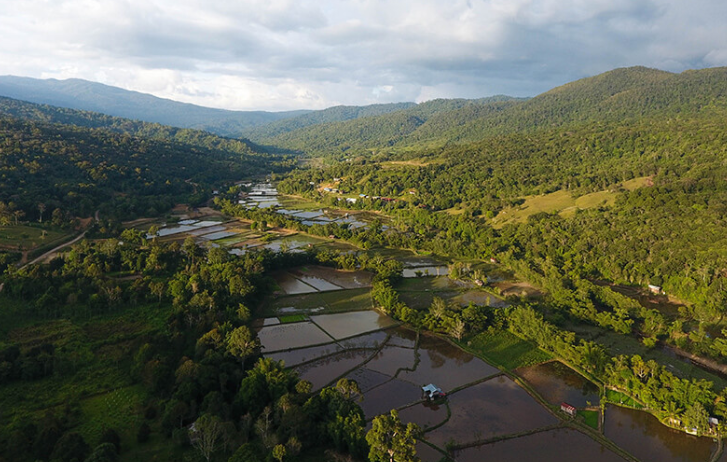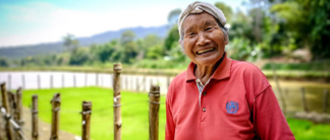
How A Social Enterprise Revitalized Rural Economies in Borneo
By FedEx | First published: October 31, 2023 Updated: August 8, 2024
Meet the young Malaysian entrepreneurs behind sustainable social enterprise Langit Collective, who bridge the gap between Borneo's rural farmers and urban consumers.
-
Remote subsistence farming communities have traditionally been cut off from commercial opportunities to sell their produce, but new rural commerce platforms have emerged to connect them to urban consumers.
-
In Borneo, Malaysia, heirloom rice farmers are selling their high-quality crops to customers in cities hundreds of miles away, revitalizing local communities and bringing in much-needed extra income for their families.
-
Langit Collective is a social enterprise in Malaysia spearheading this movement, supporting subsistence farmers to build a more sustainable future.
Tucked away in the remote villages of Borneo, generations of farmers have been producing some of Malaysia’s best heirloom rice. And until recently, their carefully-tended rice crop was never sold commercially– until a group of volunteers spotted a gap in the market.
Enter Langit Collective: a social enterprise in Malaysia that stepped in to help revitalize rural communities and create revenue for some of Borneo’s underserved farmers. We spoke to Lilian Chen, CEO of Langit Collective, to find out more about her remarkable entrepreneurship journey.
How was Langit Collective established?
Lilian Chen: All of Langit’s co-founders started out as colleagues working for a non-profit. We were building basic infrastructure for rural communities in Borneo, Malaysia. In 2015, all of us were working in a Lun Bawang village in the highlands of Lawas.
It’s a deeply special place: a valley enveloped by rainforest and hidden from the outside world. It was here we first came across one of the best crops this land can offer: heirloom rice.
Thanks to pristine air quality and beautiful streams surrounding the paddy field, the rice produced here is completely unique. As we sat down to meals of heirloom rice each day during our stay with local families, we saw a missed opportunity.
Despite traditional rice farming practices being carefully passed down through generations, the rice was only used locally. Any surplus was often fed to livestock.
We’d all grown up in the city and would have been over the moon to get access to this amazing, delicious produce where we lived! It got us thinking. Heirloom rice was a premium product with great potential – but no market.
Our collective was born, and our mission to create market access for indigenous farming communities in Sabah and Sarawak began. Our goal was simple: to link quality excess produce from rural farmers to urban markets. This would provide rural communities with a new income opportunity above and beyond their subsistence agriculture.
As a social enterprise working with suppliers in remote rural areas in Borneo, what challenges have you faced so far?
The first one is logistics. The physical remoteness of the villages is a major challenge. There is no infrastructure in this part of Borneo. Logistic solutions are hard to come by and extremely costly.
The highland farms are four hours away from the nearest town by dirt track. We had to make sure they’re reachable with 4x4s and drivers are available who have experience with the area and terrain.
Incredibly, it can take over two months to move rice from villages to our warehouse in West Malaysia. After extensive testing and route-mapping exactly how to do this, we put an entire transportation system in place where none existed before.
The second is cash flow. As our farmers get paid in cash at the farm gates, our capital is mostly tied up in stock that spends a lot of time in transit. This poses a major growth challenge. We need regular access to funds to expand our business.
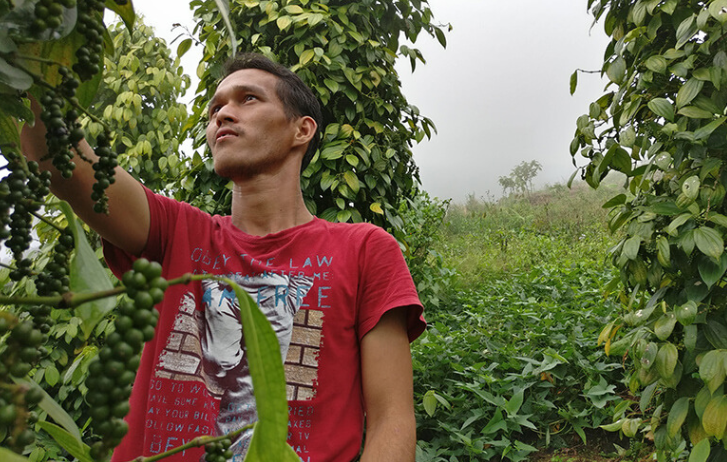


And most consumers have no idea of the complex bureaucratic challenges that exist when it comes to selling rice! Conventional white rice is the standard measure used by the Malaysian government to gauge food security, which means the entire industry is heavily regulated.
Every player in the supply chain of the paddy or rice industry – no matter how minor – requires a license that can be expensive and onerous to procure. This prolongs the time it takes to move rice from Sarawak to Kuala Lumpur and further exacerbates our capital problems.
One other challenge is the inconsistency of the end-product when using rice from indigenous farmers. As subsistence farmers, the Lun Bawang communities are not over-particular about the rice that they mill.
Broken rice or over-polished rice is perfectly acceptable to eat, but not to be sold. Every single round of procurement means another quality control conversation with the farmers. Subsistence farmers are also limited by their homestead milling machines, which don’t offer many options to fine-tune.
How do you measure success as a sustainable farming enterprise?
The financial impact we create is pretty straightforward: any rice procured from the community is already additional income that would have not otherwise been monetized.
Beyond a number, the additional income means that some subsistence farmers can finally afford to buy tiles for the kitchen or toilets for their house, which has been a continuous work in progress for the past 20 years.
It can also mean that they can afford to fly their children who are in boarding schools across the country back home, even for a short holiday. As a social enterprise in Malaysia, what we measure is community impact and the overall economic wellness of rural areas.
Do you have plans to expand Langit Collective cross-border?
We started our journey with the indigenous communities of rural Malaysia, which has led us into a larger conversation on food systems and sustainability.
Nine years on, we work with sustainable farming communities in Borneo to produce different crops, collaborating with like-minded organizations across the country.
Our products are available in retail outlets across Malaysia and on our website – and we’re looking to expand to other markets in Southeast Asia. Our first target is Singapore, where we have interest from chefs who would like to import our ingredients.
We’re part of a push to help elevate the culinary industry and heritage of Malaysia. By exploring modern Malaysian cuisine and produce, we can expand its global and commercial potential.
Langit Collective is part of a network of artisanal producers championing heritage ingredients. We look forward to more meaningful collaborations with brands and organizations that work towards sustainability and quality.
What takeaways and insights do you have for social enterprises in Malaysia and beyond?
Social enterprises plug some of the gaps that governments or NGOs might have missed, so our role in society is crucial.
Yet there’s still a lack of understanding about what a social enterprise model can look like, even among potential investors. Compared with tech startups in Asia and other businesses, there’s a distinct lack of resources afforded to social enterprises.
With the recent emphasis placed on ESG, there’s now a lot more attention and interest in sustainable social enterprises, especially for big corporations looking to incorporate impact into their reporting and operations.
Most social enterprise models are built with at least one of the components of ESG in mind, so it’s only natural that social enterprise operations fulfil or even exceed some ESG requirements.
What advice do you have for budding entrepreneurs in Malaysia?
Anything that’s worth doing is probably going to be challenging. And things take time. It took us one and a half years to convince the chef of a well-known restaurant to work with us and feature some of our products on his menu.
Also, think about how your business intersects with other areas, and what you can offer alongside your main revenue stream.
One thing we offer is experiential travel: immersive tourism for customers, partners, and other stakeholders to experience a harvest or paddy tour. These deepen understanding of our business, encourage investment, and strengthen existing partnerships.
Demonstrating what your business offers first-hand, and on a human level, is important – whether that’s a retail space, factory, or workshop tour. In-person connections help get to the heart of your product and what you do.
Helping to create a new narrative for rural, sustainable farming in Borneo
The entrepreneurial journey of Lilian Chen and her fellow co-founders sets an aspirational example for future entrepreneurs, especially social enterprises or female-owned startups in Malaysia looking to help drive social, economic and sustainable impact locally.
To find out more about Langit Collective, visit their website here.
To find out how FedEx can help get your business off the ground, or solve a unique logistics need, head here.
SHARE THIS STORY
- 85% Of APAC Businesses Plan To Expand Into Europe, According To New FedEx Report
- Generative AI: A New Frontier
- How To Ship A Giant Panda
- The Rise Of Intra-Asia Trade: Opportunities In The China-Southeast Asia Corridor
- Where Do Old Planes Go When They Retire?
- What’s So Dangerous About Coconuts? Your Guide To Dangerous Goods Logistics
Sign up now and save on your shipping rates!
Sign up now and earn discounts by shipping instantly with FedEx Ship ManagerTM at fedex.com.
Recommended For You

How A Malaysian Skincare Brand Took On The International Market
Entrepreneur Kaii Lim shares his journey to develop the best skincare brand in Malaysia, and the custom logistics solutions that helped him expand.
Read More
How 3 Sisters Launched A Malaysian Fashion Brand Globally
Nurul Zulkifli, a homegrown Malaysian entrepreneur, reflects on her journey to success and shares tips for e-commerce businesses in Asia.
Read More
How To Turn Sustainable Ideas Into Impactful Products
Antoinette started SuperBee as a sustainable solution to combat plastic pollution. Rooted in local communities, her brand is creating worldwide buzz.
Read More
